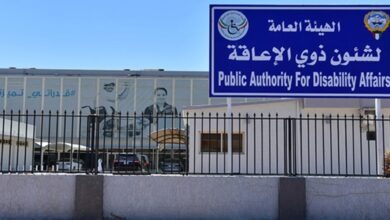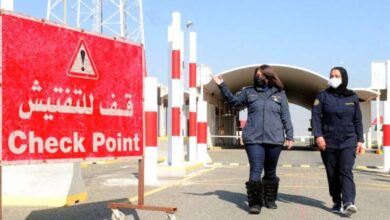Kuwait’s new residency law imposes up to five years in jail and a 10,000 dinar fine
The new law enforces strict penalties, including one-year sentences and fines up to 2,000 dinars for residency violations and up to three years in prison with a 3,000 dinars fine for illegal entry.

• Temporary accommodation lasts up to three months, extendable to one year, while normal residence is capped at five years, with extensions for Kuwaiti children for ten years, property owners for ten years, and investors for 15 years, and domestic workers may not stay abroad for more than four months.
• Foreigners must report passport loss or damage within two weeks, notify the Ministry of the Interior within 24 hours of leaving hotels or residences, and inform the ministry if they overstay their visa, with fines of up to 2,000 dinars for non-compliance.
• Hotel managers, ship and aircraft captains, and bus or car drivers face fines of up to 400 dinars for violations.Employing a foreigner unlawfully or failing to pay their dues can result in up to two years in prison and fines up to 10,000 dinars.
At its November 12 meeting, the Council of Ministers approved a draft decree-law on foreign residency, introducing severe penalties for violators and brokers, including up to five years in prison and fines of 10,000 dinars.
The decree, a copy of which was obtained by Al-Rai newspaper, comprises seven chapters and 36 articles.
1. Chapter I: Entry of foreigners
Article 1: A foreigner may not enter or leave Kuwait unless they hold a valid passport issued by the competent authorities of their country or another recognized authority, or possess a document issued by such authorities in lieu of a passport.
Citizens of Gulf Cooperation Council (GCC) member states are exempt from the preceding provision, as an identity card is sufficient for their entry.
The Minister of Interior shall establish the necessary regulations to define this card, in coordination with the countries.
Article 2: The Minister of Interior shall issue a decision determining the types of entry permits and the procedures required to obtain them.
Article 3: Nationals of countries specified by a decree, issued based on the recommendation of the Minister of Interior and subject to reciprocity, shall be exempt from obtaining an entry permit.
Article 4: A foreigner may only enter or leave the State of Kuwait through designated entry and exit points and in accordance with procedures established by the Minister of Interior.
Article 5: Captains of ships and aircraft, as well as bus and car drivers, must provide the competent officer with a statement listing the names of their crew, assistants, and passengers, along with their relevant details, upon arrival or departure from Kuwait. They must notify the authorities of any passengers without valid passports or whose passports are found to be incorrect or invalid. Such individuals must be prevented from disembarking upon arrival or boarding upon departure.
2. Chapter II: Notification of competent authorities
Article 7: Foreigners must present their passport or equivalent document upon request, provide any requested information, and report to the competent authorities at the Ministry of Interior on the specified date. In the event of loss or damage to the passport or equivalent document, they must notify the competent authorities within two weeks of the incident.
Article 8: Managers of hotels and furnished accommodations intended for rent must report to the competent authority at the Ministry of Interior the arrival and departure of foreigners staying at their facilities within 24 hours. They must maintain books and records related to the stay of such individuals.
Police officers designated by a decision of the Minister of Interior are authorized to inspect these books and records, document any violations of this law discovered during inspections, and refer the violations to the competent authorities.
A decision shall be issued by the Minister of Interior to determine the procedures in this regard.
3. Chapter III: Residence of foreigners
Article 9: Every foreigner intending to reside in the State of Kuwait must obtain a residence permit from the Ministry of Interior.
Article 10: A Kuwaiti citizen has the right to obtain a residence permit for their foreign spouse. Additionally, a Kuwaiti woman can obtain a residence permit for her foreign husband and children, provided that she did not acquire her citizenship through marriage to a Kuwaiti man.
A foreign widow or divorcee of a Kuwaiti citizen, with children from him, is entitled to obtain a residence permit.
Article 11: A foreigner entering the State of Kuwait for a visit may stay for a period not exceeding three months and must leave upon its expiration unless a residence permit is obtained from the Ministry of Interior.
Article 12: A foreigner may be granted temporary residence in Kuwait for a period not exceeding three months. Upon expiration, the individual must leave the country unless the residence is renewed for a period not exceeding one year or a regular residence permit is obtained from the competent authority of the Ministry of Interior.
The Minister of Interior shall determine the terms and conditions under which temporary residence is granted.
Article 13: A foreigner may be granted a normal residence permit for a period not exceeding five years.
Residence permits for up to ten years may be granted to children of Kuwaiti citizens, real estate owners in Kuwait, and other categories specified by the Minister of Interior.
Investors subject to the provisions of Law No. (116) of 2013 on the promotion of direct investment may be granted residence permits for up to 15 years, with the Council of Ministers issuing regulations in this regard.
In all cases, the foreigner’s passport must be valid. If the residence permit expires or the renewal request is rejected, the foreigner must leave Kuwait unless a new residence permit is issued.
Except for children of Kuwaiti citizens, real estate owners, and investors, foreign residents may not stay outside Kuwait for more than six months unless prior permission is obtained from the Ministry of Interior. Failure to do so will result in the cancellation of the residence permit.
The Minister of the Interior shall determine the conditions and procedures for granting and renewing residence in accordance with this article.
Article 14: Domestic workers and similar categories may be granted regular residence permits under the provisions of Article 13 of this Decree-Law, limited to the duration of their recruitment contracts.
The employer must notify the competent authority at the Ministry of Interior within two weeks if the domestic worker or similar employee leaves their employment.
If the worker leaves their job, their residence permit will be canceled from the date of departure. They may, however, be granted a new residence permit by the competent authority at the Ministry of Interior.
In all cases, the transfer of a domestic worker’s residence permit requires the employer’s consent or approval from the competent authority at the Ministry of Interior, provided the transfer aligns with public interest and the provisions of the Domestic Workers Law.
A domestic worker may not remain outside the State of Kuwait for more than four months unless prior permission is obtained from the Ministry of Interior. Failure to obtain permission will result in the cancellation of the residence permit.
Article 15: Without prejudice to the provisions of Article 13 of this Decree-Law, employees in government agencies or workers in non-governmental entities may be granted regular residence permits at the request of their respective employers, provided they hold valid work passports.
If the residence permit expires and is not renewed, or if the employee does not obtain another residence permit through a different entity, they must leave Kuwait within a period specified by the competent authority at the Ministry of Interior, not exceeding six months from the termination of service.
Employees of government entities may not be granted residence permits with other entities without the consent of their original employer. Workers in non-governmental entities may not be granted new residence permits without approval from the competent authority at the Ministry of Interior.
Governmental or non-governmental entities, as applicable, must notify the competent authorities at the Ministry of Interior within two weeks if an employee’s service ends or if they leave their employment.
Article 16: Foreigners must notify the competent authority at the Ministry of Interior upon the termination of their entry, temporary residence, or normal residence if they do not leave the State of Kuwait.
Article 17: All fees related to residence permits, their renewal, and all types of entry permits shall be determined by a decision of the Minister of Interior. Kuwaiti children holding residence permits under the provisions of Article 10(1) of this Decree-Law, along with other cases specified by the Minister of Interior, shall be exempt from these fees.
4. Chapter IV: Residency trafficking and related crimes
Article 18: It is prohibited to engage in residency trafficking, including exploiting or facilitating the recruitment of a foreigner under an entry permit, residence permit, or its renewal in exchange for financial compensation, benefits, or promises, whether for oneself or others. This includes recruitment or renewal for actual, fictitious, or alleged employment, or for employing the foreigner either directly with the applicant or with others without authorization or in violation of the Labor Law for the private sector or the Domestic Labor Law.
Article 19: Employers or foreigners are prohibited fromoperating for the purpose of unauthorized recruitment and allowing, enabling, or facilitating the foreigner’s work with others without a license from the Ministry of Interiorand also failing unjustly to pay the dues owed to the foreign worker.
Foreigners are prohibited from working for any entity without the permission of their government employer or the competent authorities.
In all cases, third parties are strictly prohibited fromsheltering or employing a foreigner whose stay is either valid or expired and housing a foreigner who does not possess valid residency in the State of Kuwait.
• Chapter V: Rules for the deportation and expulsion of foreigners
Article 20: The Minister of Interior may issue a decision to deport any foreigner within a specified period, even if they hold a valid residence permit, in the following cases:
- If they do not have a legitimate source of income.
- If they violate the provisions of Article 19 of this Decree-Law.
- If the Minister of Interior deems their deportation necessary for public interest, public security, or public morals.
Article 21: A deportation decision for a foreigner may also include their family members who are financially dependent on them.
Article 22: A foreigner subject to a deportation decision may be detained for up to 30 days, renewable if necessary,to implement the deportation order after the granted deadline expires.
Article 23: A foreigner shall be expelled from the State of Kuwait by a decision of the Minister of Interior if they do not have a valid residence permit or if their permit has expired. The foreigner may return to Kuwait if they meet the conditions for entry as stipulated by this Decree-Law.
The Minister of Interior may exempt a deported or expelled foreigner from all fines incurred for violating the provisions of this Decree-Law, provided they leave Kuwait.
Article 24: The breadwinner or employer shall bear the expenses of deporting or expelling a foreigner from Kuwait.
Additionally, anyone who employs, harbors, or shelters a foreigner in violation of Article 19 of this Decree-Law shall also bear all expenses related to the foreigner’s deportation or expulsion.
The Minister of Interior may order the deportation expenses to be taken from the foreigner’s own assets if available.
Article 25: If a deported or expelled foreigner has interests in Kuwait that require liquidation, they shall be granted a deadline for this purpose, as determined by the Minister of Interior.
Article 26: A foreigner who has previously been deported or expelled from Kuwait may only return with the explicit permission of the Minister of Interior.
• Chapter VI: Penalties
Article 27:
- Anyone who violates the provisions of Articles (6), (14, paragraph 2), (15, paragraph 4), and (16) of this Decree-Law shall be punished with a fine of not less than 600 dinars and not more than 2,000 dinars.
- Anyone who violates the provisions of Articles (5), (7, paragraph 2), and (8) of this Decree-Law shall be punished with imprisonment for a period not exceeding three months, a fine of not less than 200 dinars and not more than 400 dinars, or both penalties.
- Anyone who violates the provisions of Articles (9), (12), (13, paragraph 5), (14, paragraph 3), and (15, paragraph 2) of this Decree-Law shall be punished with imprisonment for a period not exceeding one year, a fine of not less than 600 dinars and not more than 1,200 dinars, or both penalties.
- Anyone who violates the provisions of Article (11) of this Decree-Law shall be punished with imprisonment and a fine of not less than 1,000 dinars and not more than 2,000 dinars, or both penalties.
- Anyone who violates the provisions of Article (1) of this Decree-Law shall be punished with imprisonment for a period not exceeding six months, a fine of not less than 200 dinars and not more than 600 dinars, or both penalties.
- Anyone who violates the provisions of Articles (4) and (26) of this Decree-Law shall be punished with imprisonment for a period of not less than one year and not more than three years, a fine of not less than 1,000 dinars and not more than 3,000 dinars, or both penalties. In the case of repeat offenses, the penalty shall be imprisonment for a period of not less than three years and not more than five years, a fine of not less than 3,000 dinars and not more than 5,000 dinars, or both penalties.
- Anyone who violates the provisions of Article (19) of this Decree-Law shall be punished with imprisonment for a period not exceeding two years, a fine of not less than 5,000 dinars and not more than 10,000 dinars, or both penalties.
In cases of violations of Articles (1) and (4), the means of transport used to commit the offense, as well as any proceeds derived from it, shall be confiscated unless the transport belongs to an individual acting in good faith.
Article 28: Without prejudice to any more severe penalties stipulated in other laws:
- Anyone who violates the provisions of Article (18) of this Decree-Law shall be punished with imprisonment for a period of not less than three years and not more than five years, a fine of not less than 5,000 dinars and not more than 10,000 dinars, or both penalties.
- If multiple foreigners are involved in the offense, the penalties shall be multiplied accordingly. The penalties shall also be doubled if the offender is a public employee acting within the scope of their duties.
- In cases of repeat offenses, the prescribed penalties shall be doubled.
- If the offense is committed by a legal entity, a fine of not less than 5,000 dinars and not more than 10,000 dinars shall be imposed per violating foreigner. Additionally, the license to practice the activity shall be revoked. The individual responsible for the legal entity shall be subject to the penalties outlined in the first paragraph of this article.
- Anyone who obtains a permit through bribery, promises of benefits, or other illicit means shall be punished with imprisonment for a period not exceeding one year and a fine not exceeding 1,000 dinars.
Article 29: The Public Prosecution shall have exclusive jurisdiction to investigate, handle, and prosecute crimes related to residence trafficking.
Article 30: Without prejudice to any more severe penalties provided for in other laws, anyone who violates any other provision of this Decree-Law, its regulations, or implementing decisions shall be punished with a fine of not less than 100 dinars and not more than 200 dinars.
Article 31: Violations of the provisions of Articles (6), (7, paragraph 2), (9), (11), (12), (13, paragraph 5), (14, paragraphs 2-3), (15, paragraph 4), (16), and (19) of this Decree-Law or its regulations and implementing decisions may be resolved through reconciliation based on the following conditions:
- For violations of Article (11): Payment of 10 dinars for each day of delay.
- For violations of Articles (6), (7, paragraph 2), (9), (12), (13, paragraph 5), (14, paragraphs 2-3), and (15, paragraphs 2-4): Payment of 2 dinars per day for the first month, increasing to 4 dinars per day thereafter for each day of delay. In cases related to the residence of domestic workers, payment of 2 dinars per day of delay, with a maximum of 600 dinars.
- For violations of Article (16): If the foreigner entered on a visit visa, payment of 10 dinars for each day of delay. For other cases, payment of 4 dinars for each day of delay.
- For violations of Article (19): Payment of 3,000 dinars per violation, with the amount multiplied by the number of violating foreigners.
In all cases, the reconciliation amount must not exceed the maximum fine prescribed for the offense being reconciled.
The reconciliation amount shall be paid to the competent authority at the Ministry of Interior, and its payment shall result in the dismissal of the criminal case and all its consequences. The Minister of Interior reserves the right to reject reconciliation if deemed justified.
• Chapter VII (General provisions)
Article 32: The following are exempted from the application of the provisions of this Decree-Law:
(a) Heads of State and their family members.
(b) Heads and employees of official diplomatic missions and their family members, subject to reciprocity.
(c) Holders of diplomatic, private, and political passports, provided reciprocity is maintained.
(d) Individuals granted special exemptions by the Minister of the Interior, based on considerations of international courtesies.
Article 33: The provisions of this Decree-Law shall not conflict with international agreements on residence to which the State of Kuwait is a party.
Article 34: The executive regulations and decisions issued under Amiri Decree No. (17) of 1959 shall remain in effect until the Minister of the Interior issues the necessary regulations and decisions to implement this Decree-Law within six months from the date of its publication in the Official Gazette.
Article 35: Amiri Decree No. (17) of 1959 is hereby repealed, along with any provisions that conflict with this Decree-Law.
Article 36: The ministers, each within their respective areas of responsibility, shall implement this Decree-Law, which shall be published in the Official Gazette.
• Prohibitions
-
- Trading in residence by exploiting recruitment for money or benefits.
- Employing a foreigner for the purpose of recruitment.
- Unduly refraining from paying the foreigner’s dues.
- The foreigner’s employment by a third party without the permission of their employer.
- Sheltering or using a foreigner by third parties, whether their residence is valid or expired.
- Housing a foreigner who does not have valid residence.
• Penalties for trading in residence
-
- Imprisonment for up to 3 years and a fine of 10,000 dinars.
- The punishment is multiplied for multiple foreigners who violate the law.
- The penalty shall be doubled if the offender is a public employee acting within the scope of their job.
- In case of return, the punishment shall be doubled again.
- For legal persons, the penalty includes a fine and the cancellation of the license to practice the activity.
• Cases of deportation of a foreigner
-
- If he has no legitimate source of income.
- If he works for others without a license or permission.
- If required by public interest, public security, or public morals.
- The decision to deport a foreigner may also include his family members who are financially dependent on him.
- A foreigner who is subject to deportation may be arrested for a period not exceeding 30 days, which may be renewed.
- The minister may exempt the foreigner from fines, provided that he leaves the country.
- Deportation expenses shall be borne by the employer or the foreigner’s sponsor, or, in the case of non-compliance, by the foreigner and his family.












